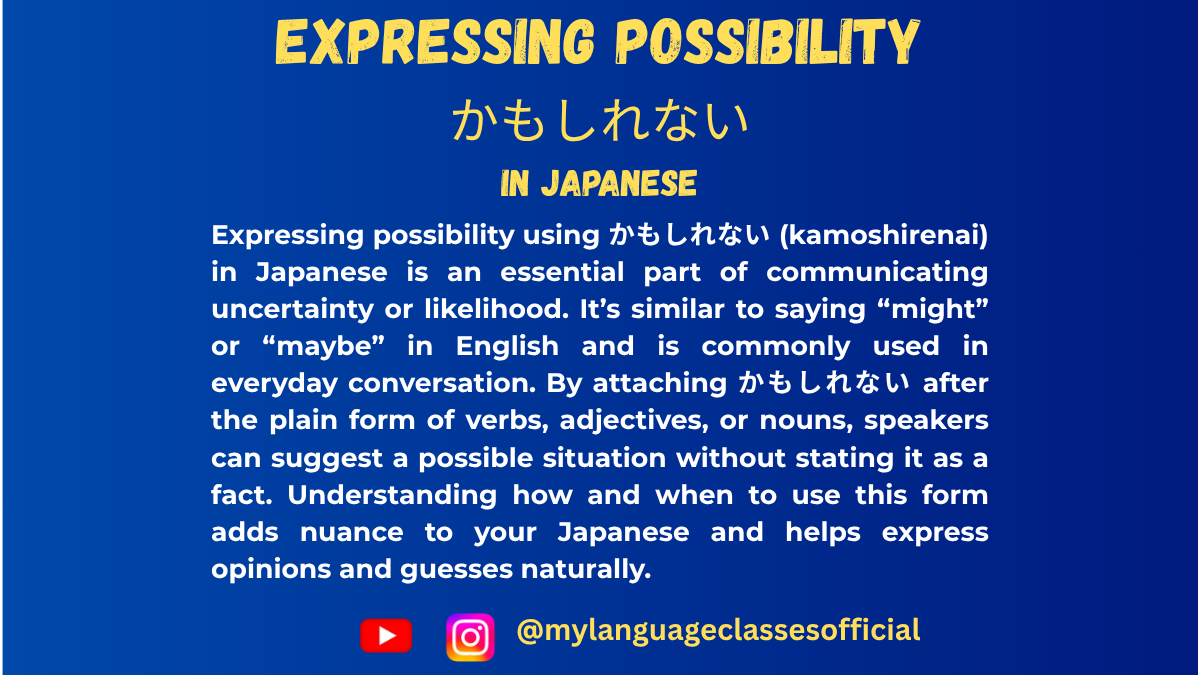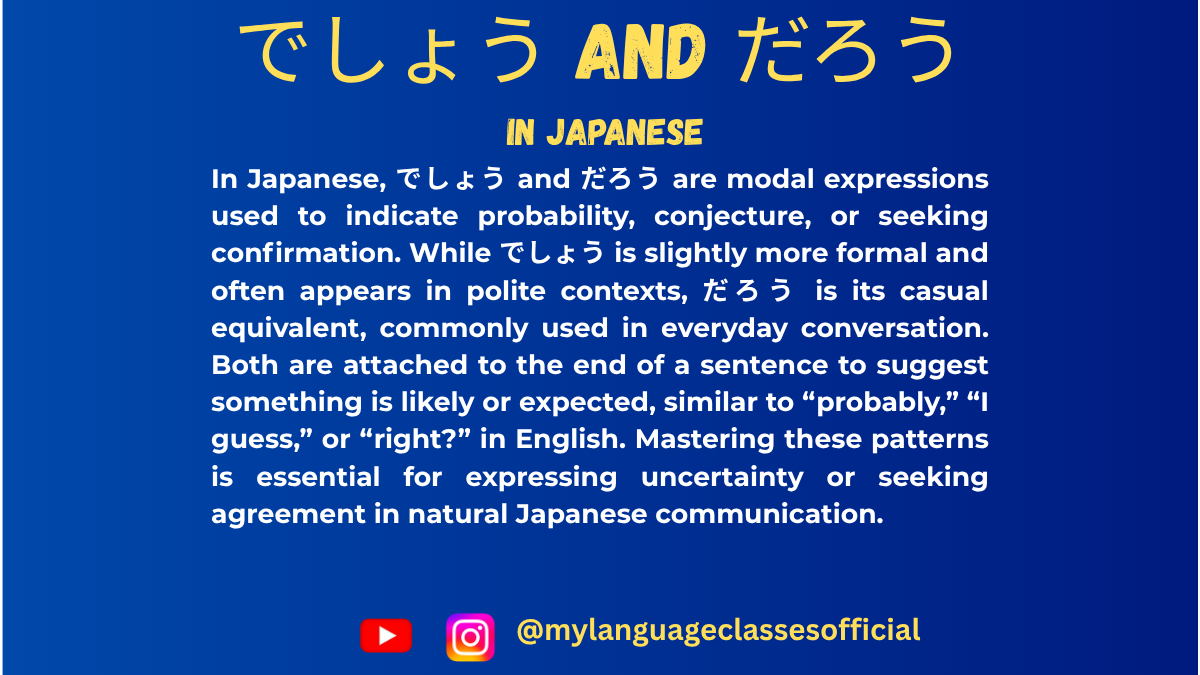Your cart is currently empty!
Tag: polite Japanese expressions
-

How to Use かもしれない | My Language Classes
Expressing Possibility in Japanese: かもしれない
When learning Japanese, understanding how to express possibility or uncertainty is essential for nuanced communication. The phrase かもしれない (かも) is a versatile and frequently used expression in Japanese to indicate that something “might” happen or “could” be the case. In this blog post, we will delve deeply into the usage of かもしれない, including its grammatical structure, variations, and common situations where it is used.
What Does かもしれない Mean?
かもしれない literally translates to “might” or “could,” expressing a sense of possibility or uncertainty about a situation. It is often used when the speaker is unsure about the likelihood of an event or fact but wants to acknowledge its potentiality.
Variations in Formality:
- Casual: かもしれない
- Polite: かもしれません
- Abbreviated (Casual Speech): かも
- Example: これは大変かも。 (This could be serious.)
Grammatical Structure
かもしれない follows directly after a predicate and can attach to various parts of speech:
- Nouns:
- Structure: [Noun] + かもしれない
- Example: これはプレゼントかもしれない。 (This might be a present.)
- Adjectives (i-adjectives):
- Structure: [i-adjective] + かもしれない
- Example: あの店は高いかもしれない。 (That shop might be expensive.)
- Adjectives (na-adjectives):
- Structure: [na-adjective] + だ + かもしれない
- Example: この話は大事だかもしれない。 (This story might be important.)
- Verbs:
- Structure: [Verb (plain form)] + かもしれない
- Example: かれは来るかもしれない。 (He might come.)
Key Points to Remember
- Degree of Possibility: かもしれない implies a low to moderate degree of certainty. It’s not used for highly probable events.
- Uncertainty Tone: This expression adds a soft, non-committal tone to statements, making it useful in conversations where certainty is lacking.
- Position in Sentence:
- Always follows the predicate directly.
- Cannot be used at the start of a sentence.
- Politeness: Use かもしれません in formal situations or when speaking to superiors.
Common Situations to Use かもしれない
Here are some typical scenarios where かもしれない is used:
1. Guessing About Someone’s Actions:
- 他は明日会社に来ないかもしれない。
(He might not come to the office tomorrow.)
2. Weather Predictions:
- 今夜は雨が降るかもしれない。
(It might rain tonight.)
3. Speculating About the Past:
- 他はこのテストに落ちたかもしれない。
(He might have failed this test.)
4. Expressing Caution:
- その道は危ないかもしれない。
(That path might be dangerous.)
5. Making Suggestions With Hesitation:
- これを使ったら良い結果がでるかもしれない。
(Using this might give good results.)
6. Talking About Plans:
- 私は今年日本へ行くかもしれない。
(I might go to Japan this year.)
7. Health Concerns:
- あなたは病気になりかけているかもしれない。
(You might be getting sick.)
Practical Notes on Usage
- Avoid Overuse: While かもしれない is useful, overusing it can make your statements seem overly speculative.
- Alternative Phrases:
- Instead of かもしれない, consider using 可能性がある (かのうせいがある, “there is a possibility”) for more formal contexts.
- Context Matters:
- Use かもしれない sparingly in professional or serious settings where certainty is preferred.
Practice Exercise
Complete the following sentences with かもしれない:
- 今日はカラオケが出る…。
(It might snow today.) - あの人はこの仕事をキャンセルする…。
(That person might cancel this task.) - この商品は新品じゃない…。
(This product might not be new.)
Conclusion
かもしれない is a subtle yet powerful expression for conveying possibility and uncertainty in Japanese. By mastering its usage, you can add nuance to your conversations and sound more natural when speaking Japanese. Practice using it in different scenarios, and you’ll find it becoming a natural part of your language toolbox!
If you enjoyed this lesson, be sure to check out more posts like this on my blog at My Language Classes. Don’t forget to subscribe my YouTube channel and follow me on Instagram for the latest language learning tips and lessons. Leave a comment below to share your thoughts, or ask any questions you have about nouns.
Happy learning! 😊
-

Understanding 〜でしょう/だろう in Japanese | My Language Classes
Expressions used to indicate probability, conjecture, or seeking confirmation
If you’re diving into the world of Japanese grammar, the particle でしょう (deshou) is one you’ll encounter frequently. It’s a versatile expression that conveys probability, speculation, or seeks confirmation. In this blog post, we’ll explore all the nuances of でしょう, its various uses, and how it interacts with other elements of the language.
1. What is でしょう?
でしょう is the polite form of だろう, which itself is derived from the copula だ (used to state facts). Depending on the context and tone, it can mean:
- “Probably”
- “I suppose”
- “Right?” (as a tag question seeking agreement)
- “It seems that”
Forming でしょう
- Nouns/Na-adjectives:
Add でしょう after the plain form.
Example:
学生 でしょう。 (It’s probably a student.) - I-adjectives:
Attach directly to the base form.
Example:
暑い でしょう。 (It’s probably hot.) - Verbs:
Attach to the plain form.
Example:
行く でしょう。 (He/she/they will probably go.)
2. Expressing Probability
One of the most common uses of でしょう is to express probability or likelihood. It’s often used when the speaker wants to indicate that something is likely true based on their knowledge or perception.
Examples:
- 明日は雨が降る でしょう。
(It will probably rain tomorrow.) - あの映画は面白い でしょう。
(That movie is probably interesting.)
In these cases, でしょう is equivalent to saying “probably” or “I think” in English. It softens the statement, showing that the speaker is not asserting something as a definite fact.
3. Asking for Confirmation
When used with a rising intonation, でしょう turns into a tag question, seeking agreement or confirmation from the listener. It can be translated as “right?” or “isn’t it?” in English.
Examples:
- このケーキ、美味しい でしょう?
(This cake is delicious, isn’t it?) - 彼は先生 でしょう?
(He’s a teacher, right?)
The rising tone at the end signals the speaker is looking for confirmation or agreement.
4. Making Guesses or Predictions
You’ll often hear でしょう in weather forecasts, news reports, or any context where predictions are made.
Examples:
- 明日の天気は晴れ でしょう。
(Tomorrow’s weather will probably be sunny.) - この問題は簡単 でしょう。
(This problem is probably easy.)
In such cases, the speaker uses でしょう to make a statement that isn’t 100% certain but is backed by reasonable evidence or context.
5. でしょう in Casual Speech: だろう
In informal situations, だろう is often used instead of でしょう, especially by men. While だろう serves the same functions, it feels less polite and more casual.
Examples:
- あれは本物のダイヤモンド だろう。
(That’s probably a real diamond.) - 今日は忙しい だろう?
(You’re busy today, right?)
6. Negative Forms
The negative equivalent of でしょう is formed by negating the predicate or verb.
Examples:
- あのレストランは高くない でしょう。
(That restaurant is probably not expensive.) - 彼は来ない でしょう。
(He probably won’t come.)
7. Using でしょう in Hypothetical or Conditional Contexts
When paired with the conditional たら or similar structures, でしょう can express speculation about hypothetical situations.
Examples:
- あの店に行ったら、何か美味しいものがある でしょう。
(If we go to that store, there will probably be something delicious.) - もっと勉強したら、試験に合格する でしょう。
(If you study more, you will probably pass the exam.)
8. Cultural Nuances and Subtleties
In Japanese communication, でしょう plays a role in maintaining politeness and avoiding direct assertions. By using でしょう, the speaker softens their statements, allowing room for the listener’s interpretation or input. This aligns with Japanese cultural norms that emphasize indirectness and respect for others’ perspectives.
For example:
- 今日は寒いです。 (It’s cold today.)
→ Direct and factual. - 今日は寒いでしょう。 (It’s probably cold today.)
→ Politer, leaving room for the listener’s agreement or alternative opinion.
9. Common Pitfalls and Misunderstandings
- でしょう vs かもしれない:
Both express uncertainty, but かもしれない conveys a lower degree of certainty compared to でしょう.
Example:
彼は来る でしょう。 (He will probably come.)
彼は来る かもしれない。 (He might come.) - Overuse in Confirmation Questions:
While でしょう is great for seeking agreement, overusing it can make your speech sound repetitive. Balance it with other expressions like よね or ね for variety.
10. Final Notes
Mastering でしょう allows you to add nuance to your Japanese and navigate conversations more smoothly. It’s a fantastic tool for expressing uncertainty politely, making predictions, or asking for confirmation. Remember:
- Use でしょう for polite speech and だろう for casual contexts.
- Pay attention to intonation when seeking confirmation.
- Practice with real-life scenarios to internalize its subtleties.
Do you have any questions about でしょう or other Japanese grammar points? Share them in the comments below, and let’s learn together! 😊
If you enjoyed this lesson, be sure to check out more posts like this on my blog at My Language Classes. Don’t forget to subscribe my YouTube channel and follow me on Instagram for the latest language learning tips and lessons. Leave a comment below to share your thoughts, or ask any questions you have about nouns.
Happy learning! 😊
